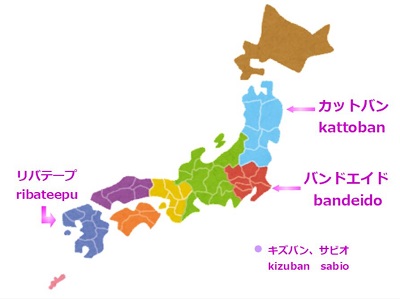Learn a Japanese medical phrase
This item may have many names in your country too. What do you call it.
Takane sensei and her family star in this amusing story of everyday life in Japan. Read on below and found out more and use this Japanese lesson blog to learn some new Japanese phrases and vocabulary.
絆創膏(ばんそうこう)
Adhesive bandage

By TAKANE Yukiko
先日、料理中に指を切ってしまいました。 探すときはないものです。
「カットバンどこ?」 娘は「絆創膏なら、そこにあるよ。」
フィリピン人の主人は「バンソコ?band-aid のこと?」
それぞれ言い方が違い、おもしろいと思いGoogleですぐに検索しました。
地域によって色々な言い方があり、関東ではバンドエイドが多く、東北ではカットバン、他にもキズバンやサビオもありました。 九州ではリバテープという言い方があるそうで、それは初めて知りました。 主人も早速検索していて、band-aidはアメリカの会社の名前とのこと。
これは娘も驚くぞと思い 「ねえ、おもしろいよ。絆創膏の言い方は・・・。」
スマホ片手に話し出すと、
「あ、それ、知ってる。You Tubeで見た。」
またYou Tubeに負けてしまいました。
To listen to this blog, please watch our Youtube video.
絆創膏(ばんそうこう)
先日(せんじつ)、料理中(りょうりちゅう)に指(ゆび)を切(き)ってしまいました。 探(さが)すときはないものです。 「カットバンどこ?」
娘(むすめ)は「絆創膏(ばんそうこう)なら、そこにあるよ。」
フィリピン人(じん)の主人(しゅじん)は「バンソコ?band-aid のこと?」
それぞれ言(い)い方(かた)が違(ちが)い、おもしろいと思(おも)いGoogleですぐに検索(けんさく)しました。
地域(ちいき)によって色々(いろいろ)な言(い)い方(かた)があり、関東(かんとう)ではバンドエイドが多(おお)く、東北(とうほく)ではカットバン、他(ほか)にもキズバンやサビオもありました。 九州(きゅうしゅう)ではリバテープという言(い)い方(かた)があるそうで、それは初(はじ)めて知(し)りました。 主人(しゅじん)も早速(さっそく)検索(けんさく)していて、band-aidはアメリカの会社(かいしゃ)の名前(なまえ)とのこと。
これは娘(むすめ)も驚(おどろ)くぞと思(おも)い
「ねえ、おもしろいよ。絆創膏(ばんそうこう)の言(い)い方(かた)は・・・。」
スマホ片手(かたて)に話(はな)し出(だ)すと、
「あ、それ、知(し)ってる。You Tubeで見(み)た。」 またYou Tubeに負(ま)けてしまいました。
Mother’s dream
Adhesive bandage
I cut my finger the other day while cooking. What is one thing that, when you need it, you can never find it? 'Where is the Bansoko (Band Aid)?' My daughter said, "If you mean an adhesive tape, it's right there." My Filipino husband said, "Bansoko? You mean a Band-Aid?"
Each of them had a different way of saying it, which I found interesting and immediately searched on Google. There were various ways of saying it depending on the region: in Kanto, many people call them Band-Aids, while in Tohoku, they say Cut-Bands, and they also use the words Kizuban and Savio. In Kyushu, there are some who use the phrase Riba Tape, which I had never heard of before. My husband also did a quick search and found that Band-Aid is the name of an American company.
I thought this would surprise my daughter. 'Hey, this is interesting. The way you say Band-Aid is..." I started talking to her while holding up my phone in one hand, "Oh, I know that one, I saw it on You Tube," she cut in. YouTube beat me to it again.
検索(けんさく) search
地域(ちいき) region
関東(かんとう) Kanto
東北(とうほく) Tohoku
九州(きゅうしゅう) Kyushu
片手(かたて)one hand
Hajimemashite, I am Yukiko Takane.
I live in Chiba Prefecture. My hometown is near the ocean and is surrounded by rice fields - its a laid-back place. The sashimi and rice is really good here. My family home makes rice as well, so I usually help out during the harvest season. I may look weak, but actually I can lift a 30kg bag of rice.
In the past, I taught Japanese in Saipan and Cebu islands. The people I got to know there are precious to me. I am really looking forward to meeting you all in the online classrooms. I have been called 'Takani' Sensei or 'Okane' sensei by my students. Well, I am not a 'crab' nor am I 'money' - the name is Takane. Doozo yoroshiku onegaishimasu.
Try to use your newly learned vocabulary and phrases all the time in the lessons. Looking forward to meeting you all in class !




